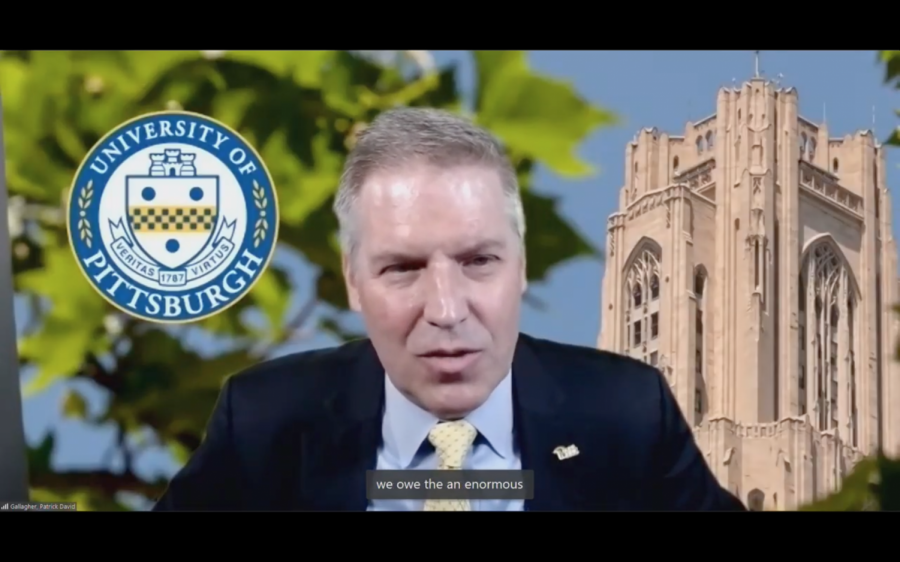Gallagher provides annual report on University initiatives at ‘seminal’ moment
Chancellor Patrick Gallagher gave an annual report at Friday morning’s board of trustees meeting.
September 25, 2020
Chancellor Patrick Gallagher said while Pitt has made strides in addressing racial injustice on campus, there is still a lot of work to do in this “seminal” moment.
“Nobody can fail to recognize that racial injustice, racial inequality, systemic racism are issues that we as an institution, as researchers, as scholars, as students have to address,” Gallagher said. “We’re seeking a place with diversity … and with equity and fairness so every Pitt student has an opportunity to excel.”
Gallagher discussed changes to Pitt because of the COVID-19 pandemic, racial justice initiatives on campus and more during his annual report on University initiatives for the 2019-20 academic year at Friday morning’s board of trustees meeting.
The chancellor said Pitt is introducing a number of new racial equity initiatives. These include new hiring steps to diversify faculty, stalling the strategic Plan for Pitt 2025 for a year to finalize programs to address racial justice and investing in the local community with Pitt’s proposed Community Engagement Center in the Hill District’s historic New Granada Theater building.
Gallagher said Pitt has also worked to increase enrollment of minority students in the past year, but the numbers are not representative of the entire country. He said Pitt’s Latinx first-year population increased 5%, from 298 to 313 students, and the Black student first-year population increased 13.4% from 313 to 355 students.
The changes arrive after Black student enrollment has declined by about two-thirds since an all-time high of about 14% in 1979. Pitt received a “D” in the University of Southern California’s annual report card on the representation of Black students at public colleges and universities.
“We’ve been making solid progress in making our student body more diverse,” Gallagher said. “Over the past 10 years our Latinx population was incredibly small so we have seen it increase relatively by leaps and bounds, but relative to the country we still have a ways to go.”
Increasing Black student enrollment was one of many demands that the Black Action Society and 17 other Black student organizations sent to University administrators over the summer. BAS reported that Pitt met some of the demands — including a new, mandatory anti-racism class for first-year students — but others, such as the creation of new scholarships and reforms to the Pitt police, were denied.
Gallagher also spoke about the $27-million Pitt Success Pell Match Program, through which the University matches federal Pell Grants, and how it has impacted student retention. The program, released in February 2019, is part of a series of other new financial aid initiatives, which together compose the largest restructuring of aid programs in Pitt’s history.
He said enrollment data pointed to a gap in retention rates for Pell-eligible students, compared to those not eligible, when moving from their first to second year at Pitt — 86.9% compared to 93.7% for fall 2018. But after introducing the Pell match program, the Pell-eligible student retention rate rose to 93.5% in fall 2019 — nearly on par with the 93.7% retention rate for non-Pell-eligible students.
“That gap in retention has essentially disappeared,” Gallagher said.
Along with racial justice initiatives, Gallagher also discussed some of the University’s plans amid the coronavirus pandemic. He said Pitt has seen large research funding across disciplines with 69 COVID-related research awards worth $81.1 million.
Gallagher added that while overall enrollment remained relatively steady for the Oakland campus, international students have faced the most challenges returning to campus. International graduate students dropped by 17% this year and undergraduates fell by 2.8%.
“A significant number of international students are deferring coming to Pitt until next spring or later hoping that some of these travel barriers cease,” Gallagher said. “We certainly hope to see them here, but those conditions will depend on the state of the pandemic.”
Gallagher said amid personal uncertainty, he is proud that members of the Pitt community stepped up to help others and reinvent the University.
“It’s a lot under these circumstances to ask people to work even harder, to give up the certainty and routines and predictability to essentially reinvent a University so it can continue its mission in a pandemic,” Gallagher said. “You have to give the credit for our success back to our community.”








